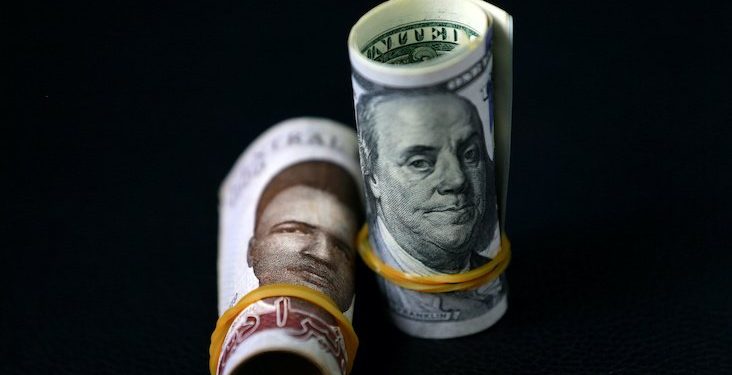With low oil prices and revenue, Nigeria will be borrowing more and facing tough economic choices in 2021 and the years ahead.
Several factors are going to push Nigeria’s public debt higher in 2021:
- A resurgence in Covid-19 cases leading to a new wave of lockdowns in Nigeria;
- Weak oil prices and deep OPEC production cuts;
- Macroeconomic uncertainty;
With the Nigerian account balance likely to remain in deficit for the year, one of Africa’s biggest economies will be forced to rely more on debts and grants to shore up its failing revenue.
Weakening flexibility
Analysts see this as threatening the fiscal flexibility of the country of more than 200 million people, as “high fiscal deficits are complicating monetary policy,” according to the International Monetary Fund (IMF).
“The interest payments to federal government revenue ratio remained high at about 58% (21% at consolidated government level) while the debt-to-GDP ratio reached 29% of GDP in 2019,” the IMF added.
Nigeria’s debt levels are much lower than those of its peers, and so an increase in the short term should not pit the government in danger.
The IMF predicts that Nigeria’s GDP will drop by 4.3% in 2020 before returning to growth of 1.7% in 2021. It projects that growth will then rise to 2.5% for the next few years after that.
Nigeria plans to spend at least 24% of its 2021 N13.5trn ($35.7bn) budget on debt servicing. It will raise an additional N4.28trn in new borrowings to fund next year’s budget, thus pushing public debt to about N35trn over a four year period.
President Muhammadu Buhari presented the 2021 spending plan to Nigeria’s lawmakers on 8 October, explaining the country’s challenges: “The 2021 budget deficit (inclusive of government owned enterprises and project-tied loans), is projected at N5.2trn. This represents 3.6% of estimated GDP, slightly above the 3% threshold set by the Fiscal Responsibility Act of 2007.”
“It is, however, to be noted that we still face the existential challenge of coronavirus pandemic and its aftermath. I believe that this provides a justification to exceed the threshold as provided for by this law. The deficit will be financed mainly by new borrowings totalling N4.28trn, N205.15bn from privatisation proceeds and N709.69bn in drawdowns on multilateral and bilateral loans secured for specific projects and programmes”, said Buhari
COVID-19 and weaker oil price push public debt higher
Nigeria’s debt stock stood at N31trn on 30 June 2020, according to the debt management office. The new borrowing pushes the debt profile of the cash-strapped government to N35trn.
“Covid-19 and weaker oil price will push public debt higher,” despite reforms, according to Razia Khan, the chief economist for Africa and Middle East at Standard Chartered. “Debt service as a percentage of revenue remains a concern,” Khan said.
Nigeria’s B2 negative credit rating reflects the country’s increasing exposure to fiscal and external shocks because of its very weak government finances that are constrained by an extremely narrow revenue base that hinders fiscal consolidation, according to Moody’s Investors Service, in its annual report.
“After this year’s economic contraction, Nigeria’s deficit will remain high and debt levels will continue to rise quickly, albeit from a moderate level,” said Aurelien Mali, Moody’s vice-president and senior credit officer.
“The country’s weak institutions and governance framework also constrain the credit profile and have significantly affected both economic growth and the government’s fiscal strength,” he explained.
Additional credit challenges include, according to the Moody’s report include the following:
- Political risks around the conflict with Islamist militant group Boko Haram;
- Potential attacks on oil infrastructure in the Niger Delta;
- Growing income inequality.
Year-on-year oil production is expected to be negative at least in the first half of 2021 due to deep OPEC cuts, as well as new lockdowns and restrictions. Therefore, the Nigerian government will be looking to make significant progress in reducing its oil dependency.
Roadblocks ahead:
Obstacles in Nigeria’s near-term outlook include:
- An uncertain foreign-exchange (FX) environment;
- Constrained productivity;
- Cautious private-sector investors;
- Socio-political threats;
- High inflation.
KPMG, for instance, expects Nigeria’s (FX) environment to remain under pressure and to be exacerbated by lower FX earnings in 2021. The country is in a tough spot and still has multiple exchange rates and continues to experience FX illiquidity.
Analysts at FSDH Capital say that Nigeria’s foreign reserves are under pressure:
- “Limited forex inflows due to Covid-19 exerted pressure on external reserves in the year”;
- “Lower inflows from crude oil intensified in the second quarter when oil price fell significantly”;
- “Capital inflows reducing due to foreign investment inflows that dipped by 50.9% year on year to $7.15bn in 2020H1 from $14.6bn in 2019H1.”
With rising imports and capital outflows that led to growth in demand for foreign currency and the overvaluation of the naira, KPMG sees liquidity remaining a challenge in 2021.








